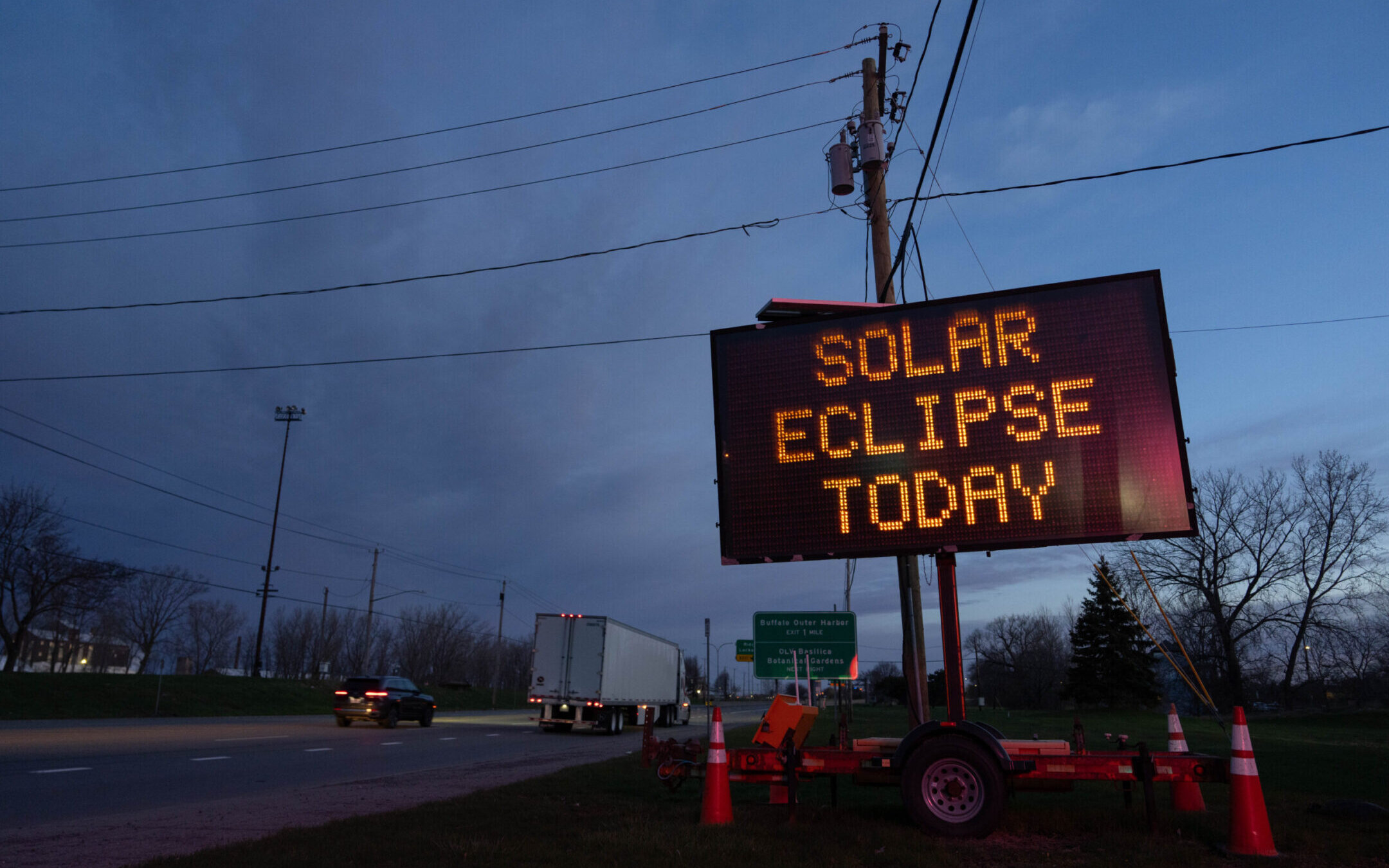Jewish tradition sees eclipses as bad omens. Many American Jews are seeking totality anyway.
Some synagogues and JCCs are hosting eclipse viewing parties, and rabbis have issued opinions on the right blessings to say (or not say)

A road sign displays a message for drivers about the solar eclipse on April 8, 2024, in Lackawanna, New York, near Niagara Falls. (Adam Gray/Getty Images)
(JTA) — The rabbis of the Talmud are famous for their disagreements. But they presented a united front on eclipses, calling the celestial event “a bad omen for the whole world.”
The attitude was common across the ancient world, when eclipses could not be predicted and were experienced as frightening, though astronomy was more developed by the time the Talmud was written in the fourth century.
But now, with a swath of the United States on the verge of experiencing a total eclipse of the sun for the last time in 20 years, contemporary Jews have had months to anticipate the eclipse that will take place on Monday afternoon — and some of them have joined the crowds of eclipse-chasers headed to the narrow path of totality.
In Rochester, New York, where the sun will be blotted out for nearly four minutes starting at 3:20 p.m., for example, the Jewish community center is hosting an eclipse party and local synagogues have invited their members to take part. In Dallas, where totality will last 10 seconds longer, Temple Emanu-El is holding a “Totality Temple” event that will include a lesson the eclipse in Jewish tradition.
One possible lesson: Because an eclipse can take place only around the time of a new moon, they are always adjacent to the start of a new Jewish month. (The month of Nisan begins Monday night.)
In recent weeks, many rabbis have offered answers to the question of the right Jewish response to witnessing the eclipse. It is not traditional for Jews to say a blessing on an eclipse, but some rabbis have pointed to all-purpose blessings reserved for witnessing natural wonders and major demonstrations of God’s might as appropriate for the moment. (One may be familiar to East Coast Jews, from last week’s surprise earthquake.) The Conservative movement even officially endorsed two options in 2017, the last time there was a major eclipse in the United States.
Others say an eclipse provides an apropos moment to reflect on the majesty of the natural world and the power of light over dark even without a religious obligation to offer a blessing. And others yet have offered technical guidance, suggesting, for example, that it would be wise to put away one’s tzitzit, or ritual fringes, during the minutes when the sun is blotted out, as Jewish law does not require them to be worn at night.
Geoffrey Mitelman, a Conservative rabbi whose organization Sinai and Synapses aims to bridge the Jewish and scientific worls, wrote on his website that he and his family are chasing totality after hearing from a scientist friend that partial eclipses are just not the same thing. Drawing on the writing of Rabbi Abraham Joshua Heschel, he says he concluded that the process of the eclipse would be experienced as an event whose impact is in some ways akin to the splitting of the Red Sea in the Passover story.
“My hope is that it will be a story told lador vador, from one generation to the next for my children and their children and their children. For all of us, it will be both a deeply personal experience that words can’t capture, and a story they will share with others across North America and for generations to come,” Mitelman writes. “Most importantly, I can’t wait to experience the incredible majesty and awe of not just, ‘Let there be light,’ but truly surprising ‘Let there be dark.’”
This article originally appeared on JTA.org.





















